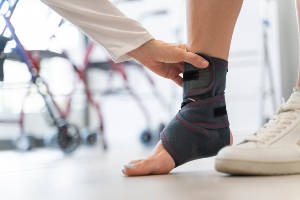The main injury you suffer in a car crash could cause another injury, often referred to as a secondary injury. This kind of injury is an indirect result of the collision, but it was still caused by the collision. These injuries can be severe and affect your recovery, which is why it is vital for you to recognize the signs.
Table of Contents
If you or a loved one has suffered secondary injuries in a Lafayette car crash, call Galloway Jefcoat’s Lafayette car accident lawyers for a free, non-obligation consultation. We have a proven track record of helping our clients recover maximum compensation for their motor vehicle crash injuries. There are no upfront costs to hire our services.
Call: 337-984-8020 today to request a FREE consultation.
What Are Secondary Injuries?

Secondary injuries occur due to the primary injury from a car crash. They may not be immediately apparent but can develop over time.
These kinds of injuries often happen during the healing and recovery process. Sometimes they are the body’s response to the trauma of the initial injury.
Various factors can cause you to suffer secondary injuries, including:
- Inadequate medical treatment
- Improper rehabilitation
- Additional strain you place on your body while you are recovering
What Are Some Common Types of Secondary Injuries From Car Crashes?
There are various types of secondary injuries that car crash victims may suffer, including:
- Infections: If you suffer a wound in the crash, it could become infected. Sometimes it is difficult to avoid an infection and other times it may be caused by the negligence of healthcare professionals involved in your treatment.
- Nerve Damage: When injuries do not properly heal or receive enough treatment, there is a risk of nerve damage. This can contribute to chronic, long-lasting pain and loss of function.
- Chronic Pain and Disability: Chronic pain is a common side effect of car crash injuries. For instance, a back injury might initially seem minor but could lead to persistent pain that affects daily activities. Chronic pain can severely limit mobility and function, leading to a diminished quality of life. It may also require ongoing medical treatment, including physical therapy and medication.
- Psychological Trauma: Psychological trauma, such as post-traumatic stress disorder (PTSD), anxiety, and depression, often occurs after a car crash. The emotional distress from the accident, combined with the physical pain, can lead to significant mental health issues. These psychological effects can interfere with your personal relationships, work and daily life. Therapy and counseling may be a necessary step towards
- Compensatory Injuries: When one body part suffers damage, you may compensate for it by overusing another body part. This can cause problems with your joints and muscle strains.
- Complications from Initial Injuries: Your primary injuries could cause many complications. For example, you could suffer an infection after breaking a bone. Complications can extend the recovery period and often require additional medical treatment, possibly including surgery.
How Do I Identify Secondary Injuries?
Identifying secondary injuries requires vigilance. Victims should be aware of changes in their health or well-being that might indicate secondary issues. Symptoms may include:
- Severe or frequent headaches
- Vision problems
- Tingling or numbness
- Dizziness
- Insomnia or excessive sleep
- Memory loss
- Confusion
- Depression or anxiety
- Reduced range of motion
- Muscle stiffness
- Unusual fatigue
- Sensitivity to light or sound
- Persistent or worsening pain
- Changes in mood or mental health
- Swelling at the site of the injury
What Are the Treatment Options for Secondary Injuries?
One of the most important aspects of treating a secondary injury is identifying it in the first place. This is the point where treatment can begin.
These are some of the potential treatment options for secondary injuries:
- Attending Regular Check-ups: Regular medical appointments are essential for monitoring recovery and detecting secondary injuries early.
- Visiting a Specialist: Depending on the nature of the secondary injuries, seeking care from specialists, such as orthopedic surgeons, neurologists, or psychologists, may be necessary.
- Attending Physical Therapy: Physical therapy can help manage chronic pain and improve mobility.
- Getting Mental Health Counseling: Therapy or counselling can address psychological trauma, helping individuals cope with PTSD, anxiety or depression.
- Document Your Injuries: Keep detailed records of your injuries, treatments and their impact on your daily life to see if they are working.
- Surgery: You may need surgery to properly treat secondary injuries.
- Medication: You may need medications for pain relief and other symptoms, like headaches.
How to Prevent Secondary Injuries
Preventing secondary injuries requires proactive care of the initial injuries sustained along with attentive follow-up care. Some strategies to consider for preventing secondary injuries include:
- Immediate medical attention: Seek prompt medical care after the initial injury to minimize complications.
- Proper rehabilitation: Follow a structured rehabilitation program for proper healing and to prevent further damage.
- Use of Assistive Devices: Utilize devices like braces, crutches or wheelchairs to avoid overexertion.
- Rest: Get the proper rest you need to prevent further injuries
- Nutrition and hydration: Maintain a healthy diet and stay hydrated to support your overall well-being
We Are Here to Help. Call Galloway Jefcoat to Learn More.
Secondary injuries from car crashes in Lafayette, Louisiana, can have profound and lasting effects. Although they are an indirect result of the crash, your lawyer can include them in your claim for compensation.
Our team at Galloway Jefcoat has been advocating for Louisiana car crash victims for many years. We offer a free consultation, so there is nothing to lose when you contact us.
Call today for trusted legal advice at 337-984-8020.